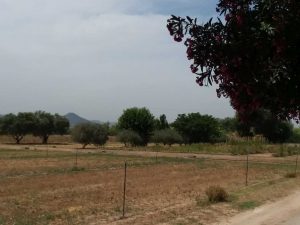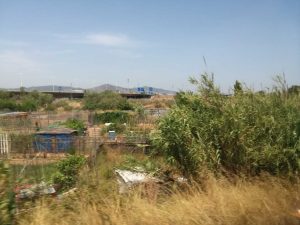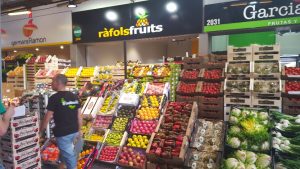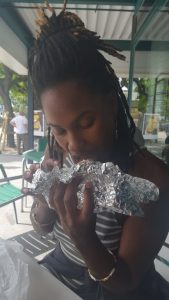Periurban Agrarian Management and Food Policies
By Anna Freitas, Candace Clark, and Margherita Del Prete
This morning our minds were off the final presentations as we took a field trip to Mercabarna and Agrarian Park Baix Llobregat. Both expanded our exploration of food systems from clearly rural areas like Priorat and Masilla Puigpulat into the metropolitan and urban geographic areas. Agrarian Park Baix Llobregat still addressed the production stage of the food system but provided new information on policy and public administration of food systems in the periurban environment. Marcabarna represented a large-scale institution of the processing, marketing, and trade stage of the food system which was a different focus than previous field trips. Marcabarna also provided us with a real-world example of how municipalities and corporations address food waste.

Agrarian Park Baix Llobregat.
Anna Freitas photo.
Agrarian Park Baix Llobregat was founded to protect agricultural land from urban expansion. The “Park” is more like an exclusive agricultural municipal zone in which multiple landowners cultivate crops. The Park’s designation as an agricultural area means that there are limitations on the ways residents can use the land. The limitations come in conflict with some needs of the area, particularly small-scale gardening.

Illegal gardens in Agrarian Park Baix Llobregat.
Anna Freitas photo.
The presentation explained that there are a few kinds of “illegal gardening” that pose a problem to the park: gardening on public land buffering roads and rivers without permission, farmers/landowners who divide their property into several parcels for non-agricultural use (e.g. barbeques and picnic tables), and landowners who subdivide their land into small parcels and allow others (the questionable kind of entrepreneur) to rent it out for non-agricultural uses as well as gardening. There is also legal “social gardening” that subdivides properties to allow for multiple gardeners and social purposes. It is acknowledged that there is a need for more gardening space in and around Barcelona but the Agrarian Park is not the place to do that. While outside the scope of “rural” policy strictly speaking, this need for local and urban food sources and food production space would be an important issue to address, and the Agrarian Park might be able to assist in some of the expertise needed to establish an urban food system.

Mercabarna food city.
Candace Clark photo
“The city that feeds you.” Mercabarna is a 24-hour city with the aim of guaranteeing the supply of fresh food to the public and was by far one of the best field trips we went on. To see an entire city that is the result of public-private innovation that employs people at the same time is the ultimate level of food security by way of collaborative governance. We wish we would have seen more of the campus, but it was entirely too big. The facility houses more than 700 companies specializing in the distribution, preparation, importing and exporting of fresh and frozen products, domestic and abroad. Mercabarna does not buy or sell food, but consider themselves the middle man for direct distribution.

Mercabarna food stall.
Candace Clark photo
They are providing the infrastructure that is conducive for successful food businesses and cooperatives: a thriving market – which is often what many farmers are missing, especially in rural areas. Having visited towards the end of the 2-week intensive course, we felt fully equipped to ask questions about how they govern and why, and to understand how “a city that feeds you” is possible. We were given tours by the president and the head of distribution, who, we are proud to say, is a woman. We believe the sense of social responsibility is what drives Mercabarna with sustainability not being a burden, but a form of innovation.

Mercabarna Gyro.
Candace Clark photo.
The Green Point, or recycling station, manages to recycle over 70% of the waste they create each day. Utilizing their Food Recovery Program they give the wasted food that is still good to food banks. They give scholarships and have more than 12,000 children on the campus every year to teach them more about agriculture and food waste. It is safe to say that Mercabarna is the first and most successful model of its kind and won’t be going anywhere soon… plus, they have great gyros.
